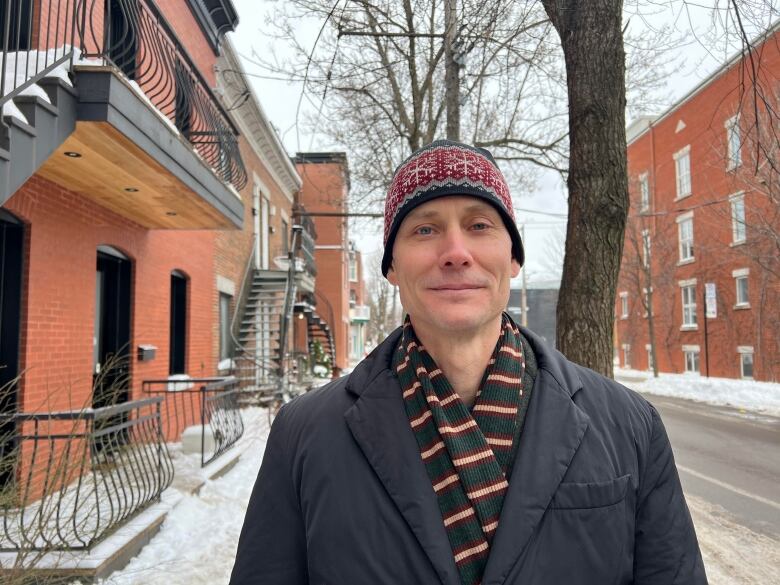New AI chatbot can do students' homework for them
Quebec teachers brace for ChatGPT helping students cheat

On the first day of class this semester, Laurent Nicolas didn't just go over his course outline.
The English teacher showed his students how ChatGPT — artificial intelligence chat software that has consumed huge quantities of data to generate original, human-like responses — could complete a written assignment in a matter of seconds.
Nicolas, who teaches at Collège André-Grasset, a private college in Montreal, asked ChatGPT to write a gothic poem about rock climbing. The response came moments later:
With every step, my heart beats fast,
As I reach for the next hold tight,
The echoes of the past,
Whisper secrets in the night.
But one of Nicolas's students was already familiar with the bot. He raised his hand and shared that he'd used it to write an essay the previous semester.
Faced with the explosive attention ChatGPT has garnered since it was made publicly available last fall, Quebec teachers are grappling with how to manage — or make the most of — the AI program in their classrooms.
A new frontier for plagiarism
Jeremy Klughaupt, an English teacher at Collège de Maisonneuve, typed some of his essay questions into the program, and was horrified by the result.
In less than a minute, the AI spat out responses comparable with the work some of his students might produce.

Klughaupt said many of his colleagues are "pulling their hair out," unsure how to proceed with their course plans and evaluations. Spotting and dealing with assignments completed by Google Translate was already a challenge. Now, with ChatGPT at his students' fingertips, he worries that the potential for fraud and plagiarism grows as this technology continues to evolve.
"As teachers, a lot of us feel torn between these two roles that we have: to educate and, increasingly, to police students," Klughaupt said.
Teachers in his department are considering abandoning take-home writing assignments. But that is a decision he is not yet prepared to make. Students hone their writing skills when engaged in long-term, immersive projects, which can't all be done in the classroom, he said.
Andrew Piper, professor in the department of languages, literatures and cultures at McGill University, agrees.
"We don't want to just get rid of essay writing," he said on CBC Montreal's Daybreak. "Writing is a fabulous way to figure out what you're trying to say and develop your thoughts and has been for a long stretch of human history."
However, Piper believes the risks go beyond academic integrity. The program's ability to easily generate massive amounts of text, which can be personalized, targeted and convincing, is a cause for concern.

"The problem is, [ChatGPT] doesn't really understand how the world works," said Piper. "It doesn't actually know if something's true. And so in certain cases, that can lead to misinformation…. There's nothing in the system that sort of flags itself."
The Quebec Ministry of Education is assessing the impacts of the technology on student learning and teacher work, especially with regard to ministerial exams. Meanwhile, in New York, ChatGPT is banned in all public schools due to concerns about its impact on learning and with its accuracy.
Harnessing the power of AI
But not all Quebec educators are worried. In fact, some are optimistic about ChatGPT and the possible emergence of AI in the province's schools.
Educators like Walcir Cardoso, professor of linguistics at Concordia University, are hoping teachers harness its power to enhance the quality of education.
Cardoso thinks ChatGPT can be effective in improving students' vocabulary, grammar and pronunciation. Teachers should also consider alternatives to essays like debates and pre-recorded presentations, he said.
As for precautions, Cardoso proposes that teachers test the AI for responses to essay questions. And he suggests students should be free to cite the chatbot for certain assignments, as long as they are transparent.
"If students want to plagiarize, they will, regardless of what is available," said Cordoso.
For its part, the Lester B. Pearson School Board is still assessing the opportunities and pitfalls that come with ChatGPT.
"It's very early on in the arrival of this technology to really be sure of what the power of it is and how it can be used effectively in the class," said Mat Canavan, director of education services at Lester B. Pearson School Board.
But he knows that if ignored, "it's going to come back and bite us" due to how quickly ChatGPT can complete an assignment.
Canavan says educators need to adapt and make the most of the tools available to them and their students. This means shifting learning to focus on creativity, voice and process — things the bot can't imitate.
"How do we incorporate artificial intelligence into the work that we're doing to make it so a student can learn deeper?" he said.
"In every instance where there's new technology that comes along, it causes a knee-jerk fear reaction. But it also creates the potential for more evolved and or in depth learning."
With files from CBC Montreal's Daybreak

